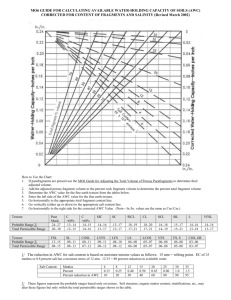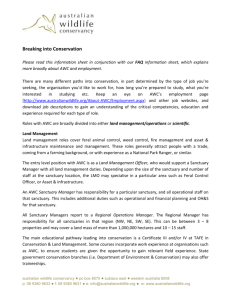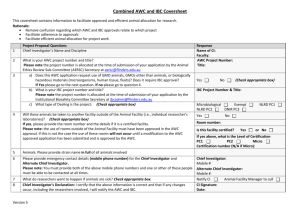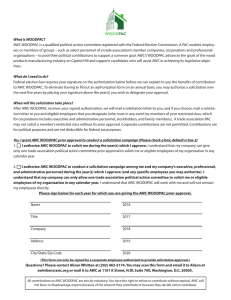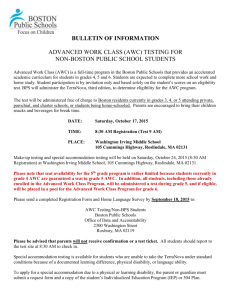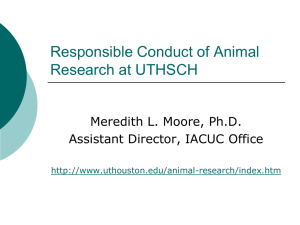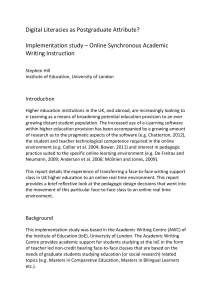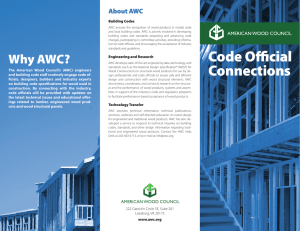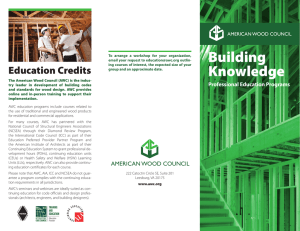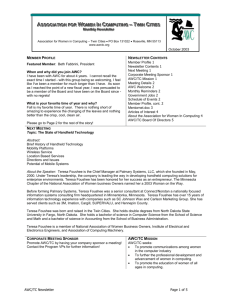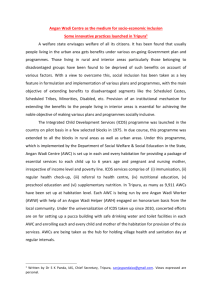FAQ - Australian Wildlife Conservancy
advertisement
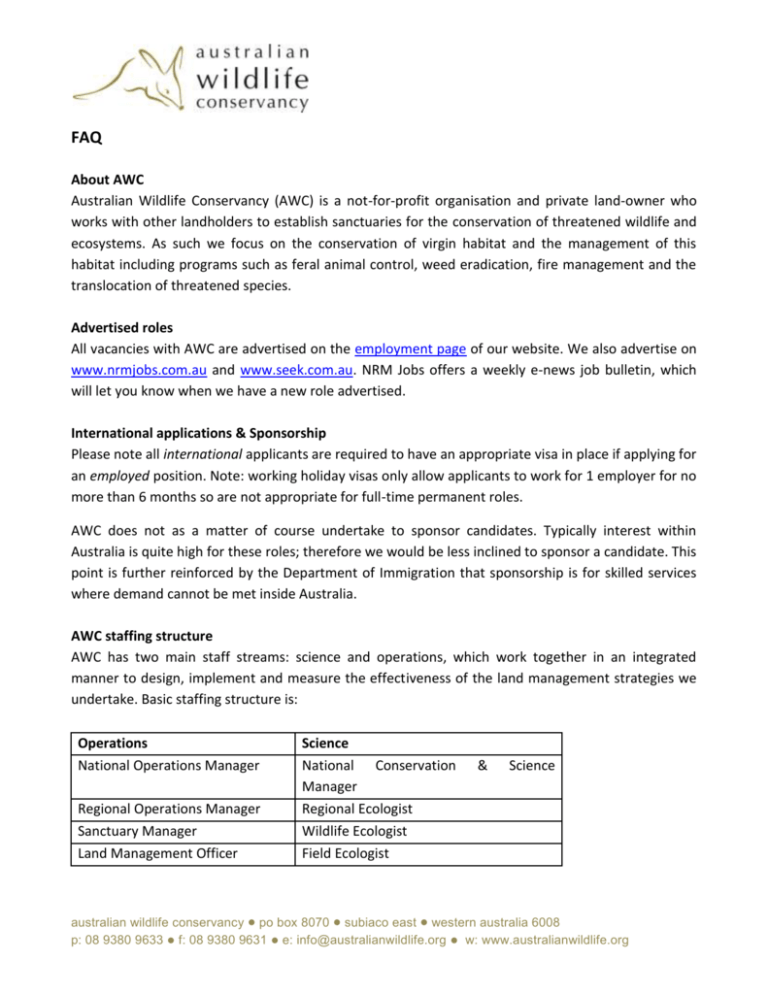
FAQ About AWC Australian Wildlife Conservancy (AWC) is a not-for-profit organisation and private land-owner who works with other landholders to establish sanctuaries for the conservation of threatened wildlife and ecosystems. As such we focus on the conservation of virgin habitat and the management of this habitat including programs such as feral animal control, weed eradication, fire management and the translocation of threatened species. Advertised roles All vacancies with AWC are advertised on the employment page of our website. We also advertise on www.nrmjobs.com.au and www.seek.com.au. NRM Jobs offers a weekly e-news job bulletin, which will let you know when we have a new role advertised. International applications & Sponsorship Please note all international applicants are required to have an appropriate visa in place if applying for an employed position. Note: working holiday visas only allow applicants to work for 1 employer for no more than 6 months so are not appropriate for full-time permanent roles. AWC does not as a matter of course undertake to sponsor candidates. Typically interest within Australia is quite high for these roles; therefore we would be less inclined to sponsor a candidate. This point is further reinforced by the Department of Immigration that sponsorship is for skilled services where demand cannot be met inside Australia. AWC staffing structure AWC has two main staff streams: science and operations, which work together in an integrated manner to design, implement and measure the effectiveness of the land management strategies we undertake. Basic staffing structure is: Operations National Operations Manager Regional Operations Manager Sanctuary Manager Land Management Officer Science National Conservation Manager Regional Ecologist Wildlife Ecologist Field Ecologist & Science australian wildlife conservancy po box 8070 subiaco east western australia 6008 p: 08 9380 9633 f: 08 9380 9631 e: info@australianwildlife.org w: www.australianwildlife.org You’ll see that the entry level scientific role with AWC would be as a Field Ecologist, which generally requires as a minimum a relevant undergraduate science degree, and usually further research, studies, published articles etc. Even at this entry level our managers would be looking for someone with a fair bit of field experience. Land management and operational roles tend to attract people with a trade (building, carpentry, plumber etc) or farming background and/or experience as a National Parks Ranger or similar. The roles require good hands-on skills in asset and infrastructure management and maintenance, and each of the sanctuaries has various requirements across fire control and management, weed control, feral animal control and cattle management. Associated studies may include a Certificate in Conservation & Land Management studies at TAFE or similar. AWC sanctuaries Our sanctuaries are divided into regions: NW, SW, SE & NE. Each of these regions is guided by a Regional Operations Manager and Regional Ecologist and supported by the various land management and scientific teams. Note: - Towns mentioned are to give a ‘general’ idea of location. - Sanctuaries noted with an * asterisks have public education and/or visitor programs in place. North West – central Kimberley sanctuaries, WA - Mornington, approx. 4 – 5 hr drive from Derby on Gibb River Rd. o Including Mornington Wilderness Camp o NW science team base. - Marion Downs - Artesian Range South West – Perth to Shark Bay, WA - Karakamia*, Gidgegannup WA o SW science team base. o Guided night walks available. - Paruna*, Chidlow WA o Self-guided and bird walks available. - Mount Gibson, Dalwallinu WA - Faure Island, Shark Bay WA South East – SA & NSW - Kalamurina, Lake Eyre SA - Yookamurra*, Sedan SA o School programs available. - Dakalanta, Eyre Peninsula SA - Buckaringa, Quorn SA V2 JW 19 March 2013 Page 2 of 4 - Scotia, half way between Mildura and Broken Hill, NSW o SE science team base. North Head, Sydney harbour NSW North East – QLD & NT - Piccaninny Plains, Cape York QLD - Brooklyn, Mossman QLD o NE science team base at Atherton tablelands. - Mount Zero-Taravale, Ingham QLD - Curramore, Kingaroy QLD - Bowra, Cunnumulla QLD - Pungalina, Borroloola NT - Newhaven, 4hrs from Alice Springs, NT - Wongalara, 4hrs from Katherine, NT Casual & Part-time job opportunities (Science) Karakamia, in the Perth hills nr Toodyay, does employ casual Guides (who require a relevant science degree) to undertake guided night walks. This is usually only for a couple of hours every few weeks, but does allow you to gain some field experience and insights into AWC. (Land Management) AWC only rarely advertise part-time or casual land management roles. More often we require Caretakers to cover staff leave periods, new sanctuaries, wet season cover and other unplanned events. Typically, volunteers will fill these roles however extended Caretaker positions do attract a salary. These vacancies generally range from 2 weeks to 3 months. Volunteers AWC does advertise for volunteers to join some of our scientific field surveys we run periodically throughout the year. Information on these and how to apply is available on the volunteer page of our website. We also advertise research projects for Honours, Master and PhD students, and offer at least 2 internships per year which are for 6 months each and offer graduates a chance to acquire further field skills. Internships are usually advertised towards the end of the year and run from April – October to coincide with the dry season across northern Australia / cooler months across southern Australia. Specialist volunteer organisations (no affiliation to AWC) include: - Conservation Volunteers Australia (CVA): http://www.conservationvolunteers.com.au/conservation-connect.asp; or if you’re still a student - International Student Volunteers (ISV): http://www.isvonline.com/index.html V2 JW 19 March 2013 Page 3 of 4 Rehabilitation The animals AWC works with are native wild animals. If your particular interest or area of expertise is with rehabilitation / animal handling, you will need to contact local rehabilitation organisations (no affiliation to AWC). In WA (Western Australia) a couple of these are: Wildlife Rehabilitation Centre - http://www.kanyanawildlife.org.au/ Fauna Rehabilitation Foundation http://www.faunafocus.com.au/public_html/pages/About.html V2 JW 19 March 2013 Page 4 of 4
